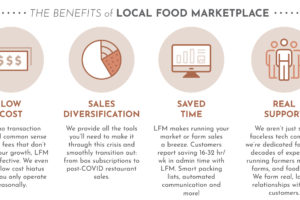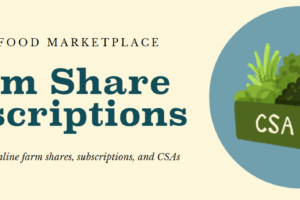
The Maui Hub began in response to an impending food security crisis on the island of Maui in the wake of COVID-19 business closures and slowing tourism. We spoke to Keith Ranney, Manager of Maui Hub, about the process of forming the hub, the bureaucratic and financial challenges they’ve faced, how they transitioned to LFM from another platform, and what he sees for their future using LFM for subscriptions and more.
LFM: Hi, Keith! Thank you so much for agreeing to be interviewed today. Walk us through how Maui Hub got started.
Keith: I had been working with Hawaii Farmers Union for around five years. At that time, lots of conversations were being had [in Maui] about food security. On the island, we rely on tourism. We’re 90% dependent on imports. People know that buying local from local producers builds the local economy. So, everyone was behind the idea of a local food hub, and the Farmers Union had been talking about putting a food hub together. The Farmers Union looked at various proposals, but none of them were quite ready to pull it off.
But when COVID-19 hit, it lit a fire under us. We realized that local businesses were shutting down, farmers were suffering, and crops were rotting. Since our economy was based almost entirely on tourism, we knew it would be a nightmare. So we created the food hub.
After the hub was launched, I became totally focused on the customer experience and accounting. However, food hubs are complex; because we are basically unfunded and all-volunteer, we had to find partners to make it work. We partnered with other organizations and companies to get refrigeration, transportation, labor, and more.
[When we went online], our web developer started us out on our first software platform.LFM: What was your experience?
Keith: (laughs) It was horrible! We did two deliveries with it, and we immediately knew that it was not tenable. It was extremely slow; the reports didn’t even work. It was impossible to figure out what was happening with a particular customer or to even look up orders. When we had a question or an issue, we felt they were not giving us straight answers.
LFM: How did you find LFM?
Keith: It was a big decision to take on a whole new system that early. At first, LFM looked like a more mature system, but it turns out that the functionality of LFM has been extremely advantageous.
LFM: What was most attractive about LFM?
Keith: The reports are fantastic. The dashboard is fantastic. LFM has considered every possible situation and automated communications, so all we had to do was fill in the blanks and customize.
LFM: What particular feature of LFM has been the most useful?
Keith: It has greatly improved our accuracy. [Since LFM], we have to do less refunds on the back end. Any customer complaints get a refund and a note goes back to the producer. It’s also super easy for us to go through each section, review, customize it to our needs, and then not even have to think about it. It’s all there.
LFM: How do you plan on retaining your customers as time goes on? Perhaps even past the threat of COVID?
Keith: That is a really deep question, actually. We recognize that people will come and go from this business; for lots of reasons. Retaining our current business level will be unique, as we are usually entirely reliant on tourism here. So that’s a problem we need to solve.
But there’s an element of our customer base that really wants to buy local, doesn’t just want to go to the grocery store, and they’re going to appreciate [shopping online] and having someone put their bag in their trunk. Our average per-customer sale had increased from the 30’s and 40’s to around the 50 dollar mark. We’ll continue boosting our trajectory with our custom CSA boxes, which have proven to be a good strategy.
We are working on our approval for the SNAP/EBT program. A lot of people here are food insecure, so this is really important. Continued growth will require some more outside funding. We’re being considered for some local funding and are hopeful that will come through soon, and we will be able to build out our team more.
Even when we mess up, there’s still a lot of loyalty. Our customers are really loyal to supporting the local economy.
LFM: If you were to recommend LFM to another market, what would you say?
Keith: The technical support at LFM is awesome. Sometimes you just want an immediate answer to your question, and LFM has been so helpful. Platforms need to evolve to be successful, and LFM does that.
LFM: Thanks so much, Keith!



